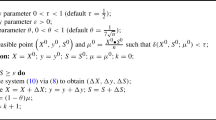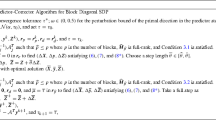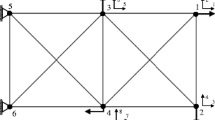Abstract
We present an infeasible primal-dual interior point method for semidefinite optimization problems, making use of constraint reduction. We show that the algorithm is globally convergent and has polynomial complexity, the first such complexity result for primal-dual constraint reduction algorithms for any class of problems. Our algorithm is a modification of one with no constraint reduction due to Potra and Sheng (1998) and can be applied whenever the data matrices are block diagonal. It thus solves as special cases any optimization problem that is a linear, convex quadratic, convex quadratically constrained, or second-order cone problem.
Similar content being viewed by others
Notes
The Matlab package is available in http://www.math.nus.edu.sg/~mattohkc/sdpt3.html.
Refer to Fujisawa, Kojima, and Nakata [36] to see how to exploit the sparsity of \({{\mathbf {A}}}_{ij}\).
References
Potra, F.A., Sheng, R.: A superlinearly convergent primal-dual infeasible-interior-point algorithm for semidefinite programming. SIAM J. Optim. 8(4), 1007–1028 (1998)
Dantzig, G.B., Ye, Y.: A Build-Up Interior-Point Method for Linear Programming: Affine Scaling Form. Tech. Rep. Stanford University, Stanford (1991)
Tone, K.: An active-set strategy in an interior point method for linear programming. Math. Progr. 59(3), 345–360 (1993)
Kaliski, J.A., Ye, Y.: A decomposition variant of the potential reduction algorithm for linear programming. Manag. Sci. 39, 757–776 (1993)
Hertog, D.D., Roos, C., Terlaky, T.: Adding and deleting constraints in the path-following method for LP. In: Advances in Optimization and Approximation, vol. 1, pp. 166–185. Springer, New York (1994)
Tits, A.L., Absil, P.A., Woessner, W.P.: Constraint reduction for linear programs with many inequality constraints. SIAM J. Optim. 17(1), 119–146 (2006)
Winternitz, L.B., Nicholls, S.O., Tits, A.L., O’Leary, D.P.: A constraint-reduced variant of Mehrotra’s predictor-corrector algorithm. Comput. Optim. Appl. 51(3), 1001–1036 (2012)
Jung, J.H., O’Leary, D.P., Tits, A.L.: Adaptive constraint reduction for training support vector machines. Electron. Trans. Numer. Anal. 31, 156–177 (2008)
Williams, J.A.: The Use of Preconditioning for Training Support Vector Machines, Master’s Thesis, Applied Mathematics and Scientific Computing Program. University of Maryland, College Park (2008)
Jung, J.H., O’Leary, D.P., Tits, A.L.: Adaptive constraint reduction for convex quadratic programming. Comput. Optim. Appl. 51(1), 125–157 (2012)
Helmberg, C., Rendl, F., Vanderbei, R.J., Wolkowicz, H.: An interior-point method for semidefinite programming. SIAM J. Optim. 6(2), 342–361 (1996)
Kojima, M., Shindoh, S., Hara, S.: Interior-point methods for the monotone semidefinite linear complementarity problem in symmetric matrices. SIAM J. Optim. 7(1), 86–125 (1997)
Monteiro, R.D.C.: Primal-dual path-following algorithms for semidefinite programming. SIAM J. Optim. 7(3), 663–678 (1997)
Alizadeh, F., Haeberly, J.P.A., Overton, M.L.: Primal-dual interior-point methods for semidefinite programming. Tech. rep., Manuscript presented at the Math. Programming Symposium, Ann Arbor, MI (1994)
Nesterov, Y.E., Todd, M.J.: Self-scaled barriers and interior-point methods for convex programming. Math. Oper. Res. 22(1), 1–42 (1997)
Nesterov, Y.E., Todd, M.J.: Primal-dual interior-point methods for self-scaled cones. SIAM J. Optim. 8(2), 324–364 (1998)
Monteiro, R.D.C., Zhang, Y.: A unified analysis for a class of long-step primal-dual path-following interior point algorithms for semidefinite programming. Math. Progr. 81(3), 281–299 (1998)
Zhang, Y.: On extending some primal-dual interior-point algorithms from linear programming to semidefinite programming. SIAM J. Optim. 8(2), 365–386 (1998)
Alizadeh, F., Haeberly, J.P.A., Overton, M.L.: Primal-dual interior-point methods for semidefinite programming: convergence rates, stability and numerical results. SIAM J. Optim. 8(3), 746–768 (1998)
Monteiro, R.D.C.: Polynomial convergence of primal-dual algorithms for semidefinite programming based on Monteiro and Zhang family of directions. SIAM J. Optim. 8(3), 797–812 (1998)
Kojima, M., Shida, M., Shindoh, S.: Local convergence of predictor-corrector infeasible-interior-point algorithms for SDPs and SDLCPs. Math. Progr. 80(2), 129–160 (1998)
Potra, F.A., Sheng, R.: Superlinear convergence of interior-point algorithms for semidefinite programming. J. Optim. Theory Appl. 99(1), 103–119 (1998)
Kojima, M., Shida, M., Shindoh, S.: A predictor-corrector interior-point algorithm for the semidefinite linear complementarity problem using the Alizadeh–Haeberly–Overton search direction. SIAM J. Optim. 9(2), 444–465 (1999)
Potra, F.A., Sheng, R.: Superlinear convergence of a predictor-corrector method for semidefinite programming without shrinking central path neighborhood. Tech. Rep. 91, Reports on Computational Mathematics, Department of Mathematics, University of Iowa (1996)
Ji, J., Potra, F.A., Sheng, R.: On the local convergence of a predictor-corrector method for semidefinite programming. SIAM J. Optim. 10(1), 195–210 (1999)
Boyd, S., Vandenberghe, L.: Convex Optimization. Cambridge University Press, New York (2004)
Schrijver, A.: A comparison of the Delsarte and Loviász bounds. IEEE Trans. Inf. Theory 25(4), 425–429 (1979)
de Klerk, E., Pasechnik, D.V., Sotirov, R.: On semidefinite programming relaxations of the traveling salesman problem. SIAM J. Optim. 19(4), 1559–1573 (2008)
Bachoc, C., Vallentin, F.: New upper bounds for kissing number from semidefinite programming. J. Am. Math. Soc. 21(3), 909–924 (2007)
Zhao, Q., Karisch, S.E., Rendl, F., Wolkowicz, H.: Semidefinite programming relaxations for the quadratic assignment problem. J. Comb. Optim. 2(1), 71–109 (1998)
Park, S.: Matrix Reduction in Numerical Optimization, Ph.D. Thesis, Computer Science Department, University of Maryland, College Park (2011). http://drum.lib.umd.edu/handle/1903/11751
Toh, K.C., Todd, M.J., Tütüncü, R.H.: On the implementation and usage of SDPT3 - a MATLAB software package for semidefinite-quadratic-linear programming, version 4.0. In: Anjos, M.F., Lasserre, J.B. (eds.) Handbook on Semidefinite, Conic and Polynomial Optimization, vol. 166, pp. 715–754. Springer, New York (2012)
Park, S., O’Leary, D.P.: A Polynomial Time Constraint Reduced Algorithm for Semidefinite Optimization Problems, with Convergence Proofs. Tech. rep., University of Maryland, College Park (2015). http://www.optimization-online.org/DB_HTML/2013/08/4011.html
de Klerk, E.: Aspects of Semidefinite Programming: Interior Point Algorithms and Selected Applications. Kluwer Academic Publishers, Norwell (2002)
Jansen, B.: Interior Point Techniques in Optimization. Kluwer Academic Publishers, Norwell (1997)
Fujisawa, K., Kojima, M., Nakata, K.: Exploiting sparsity in primal-dual interior-point methods for semidefinite programming. Math. Progr. 79(1), 235–253 (1997)
Hager, W.: Condition estimates. SIAM J. Sci. Stat. Comput. 5(2), 311–316 (1984)
Higham, N.: A survey of condition number estimation for triangular matrices. SIAM Rev. 9(4), 575–596 (1987)
O’Leary, D.P.: Estimating matrix condition numbers. SIAM J. Sci. Stat. Comput. 1(2), 205–209 (1980)
Stewart, P.G.W.: Efficient generation of random orthogonal matrices with an application to condition estimators. SIAM J. Numer. Anal. 17(3), 403–409 (1980)
Gill, P.E., Golub, G.H., Murray, W., Saunders, M.A.: Methods for modifying matrix factorizations. Math. Comput. 28(126), 505–535 (1974)
Dongarra, J.J., Moler, C.B., Bunch, J.R., Stewart, G.W.: LINPACK Users’ Guide. SIAM, Philadelphia, PA (1979)
Acknowledgments
We are very grateful to André Tits for careful reading of the manuscript, many suggestions, and insightful comments that helped shape the choice of active and inactive blocks, to Florian Potra for helpful discussions, and to anonymous referees for very careful reading and helpful suggestions.
Author information
Authors and Affiliations
Corresponding author
Additional information
Communicated by Qianchuan Zhao.
This work was supported by the US Department of Energy under Grants DESC0002218 and DESC0001862.
Rights and permissions
About this article
Cite this article
Park, S., O’Leary, D.P. A Polynomial Time Constraint-Reduced Algorithm for Semidefinite Optimization Problems. J Optim Theory Appl 166, 558–571 (2015). https://doi.org/10.1007/s10957-015-0714-z
Received:
Accepted:
Published:
Issue Date:
DOI: https://doi.org/10.1007/s10957-015-0714-z
Keywords
- Semidefinite programming
- Interior point methods
- Constraint reduction
- Primal dual infeasible
- Polynomial complexity




